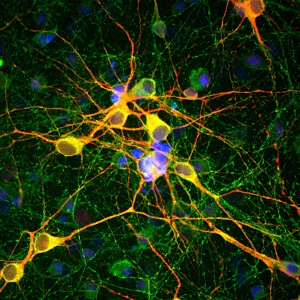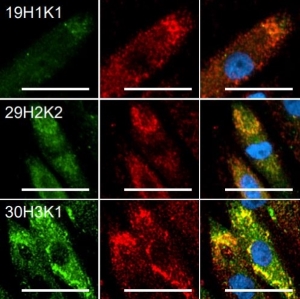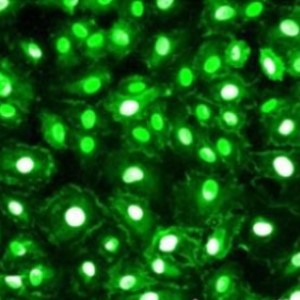Product Details
Product Sizes
| Size | List Price | Price | Cart |
|---|---|---|---|
| 100 ul | $329.00 | Add to Cart |
Ubiquitin is a globular 76 amino acid protein of about 8.5kDa molecular weight which was discovered by biochemical isolation from bovine thymus tissues. The protein was found to be highly conserved in amino acid sequence and was detectable in apparently every cell and tissue type, and, being apparently ubiquitously expressed, became known as ubiquitin. Subsequent work showed that ubiquitin has an important role in the targeting of proteins for proteolytic degradation, but has other important functions. RA22154 was made against purified bovine blood derived ubiquitin coupled to keyhole limpet hemocyanin with glutaraldehyde. The antibody is relatively insensitive to formalin fixation and so can be used on paraffin embedded fixed histological sections of human brain for studies of Alzheimer’s and other neurodegenerative diseases. Product Highlights: |
Images
Immunofluorescent analysis of HeLa cells stained with rabbit pAb to ubiquitin, RA22154, dilution 1:1,000 in red, and costained with chicken pAb to vimentin in green. The blue is DAPI staining of nuclear DNA. [A] Control HeLa cells maintained in normal medium, [B] HeLa cells treated with 10µM of the proteasome inhibitor lactacystin (Lc) for 24 hours. Proteasomal inhibition leads to formation of strongly ubiquitin positive cytoplasmic inclusions.
Western blot analysis of HEK293 cell lysates using rabbit pAb to ubiquitin, RA22154, dilution 1:5,000 in green and mouse mAb to β-Tubulin in red, used as a loading control. [1] protein standard (red), [2] cells maintained in normal medium, [3] cells treated with proteasome inhibitor lactacystin (Lc) at 10µM for 16 hours. The smear detected above the 200kDa standard represents accumulations of ubiquitinated proteins in the Lc treated cells.






